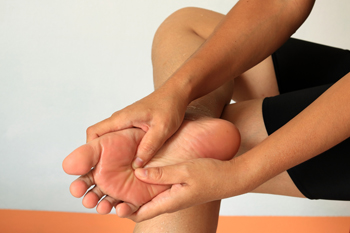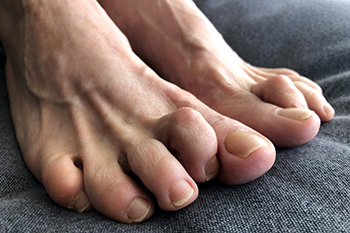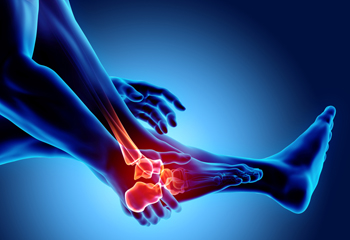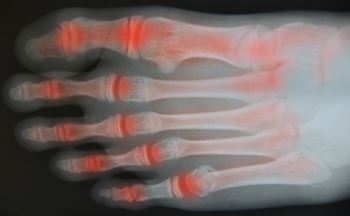Items filtered by date: May 2022
Three Categories of Nerves

Peripheral neuropathy is a nerve disorder that can affect the feet. It typically causes the inability to feel sensations in the feet, and is prevalent among diabetic patients. Elevated glucose levels can cause neuropathy in the feet, and can be dangerous among diabetics. Neuropathy can affect many types of nerves. The most common are motor, sensory, and autonomic nerves. Motor nerves include those that allow us to walk, talk, and grasp objects. The pain that is felt from a cut is classified as a sensory nerve, and breathing, digestion, and heart functions are in the autonomic nerve category. Muscle weakness is associated with neuropathy, and can be caused by physical injury, arthritis, and diabetes. If you have a lack of feeling in your feet, it is strongly suggested that you are under the care of a podiatrist who can treat and help you to manage neuropathy.
Neuropathy
Neuropathy can be a potentially serious condition, especially if it is left undiagnosed. If you have any concerns that you may be experiencing nerve loss in your feet, consult with Gregory Rorick, DPM from Rorick Podiatry, PC. Our doctor will assess your condition and provide you with quality foot and ankle treatment for neuropathy.
What Is Neuropathy?
Neuropathy is a condition that leads to damage to the nerves in the body. Peripheral neuropathy, or neuropathy that affects your peripheral nervous system, usually occurs in the feet. Neuropathy can be triggered by a number of different causes. Such causes include diabetes, infections, cancers, disorders, and toxic substances.
Symptoms of Neuropathy Include:
- Numbness
- Sensation loss
- Prickling and tingling sensations
- Throbbing, freezing, burning pains
- Muscle weakness
Those with diabetes are at serious risk due to being unable to feel an ulcer on their feet. Diabetics usually also suffer from poor blood circulation. This can lead to the wound not healing, infections occurring, and the limb may have to be amputated.
Treatment
To treat neuropathy in the foot, podiatrists will first diagnose the cause of the neuropathy. Figuring out the underlying cause of the neuropathy will allow the podiatrist to prescribe the best treatment, whether it be caused by diabetes, toxic substance exposure, infection, etc. If the nerve has not died, then it’s possible that sensation may be able to return to the foot.
Pain medication may be issued for pain. Electrical nerve stimulation can be used to stimulate nerves. If the neuropathy is caused from pressure on the nerves, then surgery may be necessary.
If you have any questions, please feel free to contact our office located in New York Mills, Utica, NY . We offer the newest diagnostic and treatment technologies for all your foot care needs.
Podiatry Services for Neurodivergent Children

While autism is a neurological condition some neurodivergent children, particularly those who are autistic, may have problems with their legs and feet to a greater degree than their neurotypical peers. Autistic children may have low muscle tone or hypotonia which occurs when limbs are floppy and hard to move. Given that autistic children react to external stimuli with sensitivity, their feet may be sensitive to the shoes they wear too. Children with this condition can be uncomfortable with any type of movement including walking, running, and even standing. Some children grow out of this while others do not. Such issues increase autism symptoms and can make the child unhappy or irritable. Specialized footwear, specific exercises, and orthotic inserts might help improve children’s movement. It is suggested that autistic children have regular visits with a podiatrist to check for foot discomfort and help to manage their symptoms.
Making sure that your children maintain good foot health is very important as they grow. If you have any questions, contact Gregory Rorick, DPM of Rorick Podiatry, PC. Our doctor can provide the care you need to keep you pain-free and on your feet.
Keeping Children's Feet Healthy
Having healthy feet during childhood can help prevent medical problems later in life, namely in the back and legs. As children grow, their feet require different types of care. Here are some things to consider...
Although babies do not walk yet, it is still very important to take care of their feet.
Avoid putting tight shoes or socks on his or her feet.
Allow the baby to stretch and kick his or her feet to feel comfortable.
As a toddler, kids are now on the move and begin to develop differently. At this age, toddlers are getting a feel for walking, so don’t be alarmed if your toddler is unsteady or ‘walks funny’.
As your child gets older, it is important to teach them how to take care of their feet.
Show them proper hygiene to prevent infections such as fungus.
Be watchful for any pain or injury.
Have all injuries checked by a doctor as soon as possible.
Comfortable, protective shoes should always be worn, especially at play.
If you have any questions please feel free to contact our office located in New York Mills, Utica, NY . We offer the newest diagnostic and treatment technologies for all your foot and ankle needs.
Why Do I Have a Hammertoe?

A hammertoe is a deformity where the middle of a toe joint is bent and the end of the toe angles down resembling a claw. It usually involves the second toe but also can involve other toes. A corn often develops on the top of the toe and a callus on the sole of the foot. Over time, one cannot straighten the toe and walking can become painful. Causes of hammertoe are wearing narrow, short shoes that force the second toe to bend forward or a congenital defect that develops over time. The muscles and tendons in the toe tighten and become shorter. Those who wear high heels or shoes that do not fit properly are more apt to suffer from this condition. Wearing properly fitting footwear that does not put the foot at an angle, with soft insoles to relieve pressure on the toes, can help prevent hammertoe. Since a hammertoe can become painful and interfere with normal functioning, seeing a podiatrist for proper diagnosis and treatment is suggested. Sometimes surgery to straighten the joint will be necessary.
Hammertoe
Hammertoes can be a painful condition to live with. For more information, contact Gregory Rorick, DPM from Rorick Podiatry, PC. Our doctor will answer any of your foot- and ankle-related questions.
Hammertoe is a foot deformity that affects the joints of the second, third, fourth, or fifth toes of your feet. It is a painful foot condition in which these toes curl and arch up, which can often lead to pain when wearing footwear.
Symptoms
- Pain in the affected toes
- Development of corns or calluses due to friction
- Inflammation
- Redness
- Contracture of the toes
Causes
Genetics – People who are genetically predisposed to hammertoe are often more susceptible
Arthritis – Because arthritis affects the joints in your toes, further deformities stemming from arthritis can occur
Trauma – Direct trauma to the toes could potentially lead to hammertoe
Ill-fitting shoes – Undue pressure on the front of the toes from ill-fitting shoes can potentially lead to the development of hammertoe
Treatment
Orthotics – Custom made inserts can be used to help relieve pressure placed on the toes and therefore relieve some of the pain associated with it
Medications – Oral medications such as anti-inflammatories or NSAIDs could be used to treat the pain and inflammation hammertoes causes. Injections of corticosteroids are also sometimes used
Surgery – In more severe cases where the hammertoes have become more rigid, foot surgery is a potential option
If you have any questions please contact our office located in New York Mills, Utica, NY . We offer the newest diagnostic and treatment technologies for all your foot and ankle needs.
It's Time for Beautiful Feet
Seeing a Podiatrist for Rheumatoid Arthritis of the Feet

Rheumatoid arthritis (RA) is a chronic inflammatory disease that can affect the joints of the feet. One who has RA of the feet often experiences pain and swelling in the feet, which can impair functioning and quality of life. Though there is no cure for this condition, treatments focus on preventing the disease from progressing by reducing or stopping joint inflammation. One might experience relief from one or a combination of RA management regimens, such as anti-inflammatory medication, more supportive footwear, orthotics, physical or occupational therapy, and even surgery. If you are experiencing pain from RA of the feet, consult with a podiatrist who can help devise a treatment plan to help relieve uncomfortable symptoms and preserve joint structure and function.
Because RA affects more than just your joints, including the joints in your feet and ankles, it is important to seek early diagnosis from your podiatrist if you feel like the pain in your feet might be caused by RA. For more information, contact Gregory Rorick, DPM of Rorick Podiatry, PC. Our doctor will assist you with all of your podiatric concerns.
What Is Rheumatoid Arthritis?
Rheumatoid Arthritis (RA) is an autoimmune disorder in which the body’s own immune system attacks the membranes surrounding the joints. Inflammation of the lining and eventually the destruction of the joint’s cartilage and bone occur, causing severe pain and immobility.
Rheumatoid Arthritis of the Feet
Although RA usually attacks multiple bones and joints throughout the entire body, almost 90 percent of cases result in pain in the foot or ankle area.
Symptoms
- Swelling and pain in the feet
- Stiffness in the feet
- Pain on the ball or sole of feet
- Joint shift and deformation
Diagnosis
Quick diagnosis of RA in the feet is important so that the podiatrist can treat the area effectively. Your doctor will ask you about your medical history, occupation, and lifestyle to determine the origin of the condition. Rheumatoid Factor tests help to determine if someone is affected by the disease.
If you have any questions please feel free to contact our office located in New York Mills, Utica, NY . We offer the newest diagnostic and treatment technologies for all your foot and ankle needs.
Ways to Live with Arthritis

Many people suffer from the pain of arthritis, of which there are about 100 varieties. A podiatrist can help you figure out which form of this disease you have through a number of tests. The most common types are osteoarthritis, which is a wearing away of the cartilage between the bones; rheumatoid arthritis, a long-term condition that causes pain, swelling and deformity in the joints; and gout, caused by a buildup of uric acid that results in redness, swelling, and pain affecting the big toe and other joints. Among the ways you can live with arthritis are diet, exercise and pain management. It has been found that eating a Mediterranean style diet (fish, nuts, olive oil, vegetables and fruit) can help reduce the effects of arthritis. It is also suggested that you avoid red meat, poultry and full-fat dairy products, and try to include calcium rich foods to ward off osteoporosis (thinning of the bones). A regular program of exercise is suggested to help keep your weight down and reduce joint stiffness. A number of medications are available to alleviate the pain caused by arthritis. In addition, using heat or ice treatments as needed throughout the day and avoiding activities that increase your pain is suggested. Changing the way you operate with appropriate walking aids, raised toilet seats, and safely navigating in your home can be helpful. If you need more information on how to manage arthritis, please consult with a podiatrist for an examination and treatment options.
Arthritis can be a difficult condition to live with. If you are seeking treatment, contact Gregory Rorick, DPM from Rorick Podiatry, PC. Our doctor can provide the care you need to keep you pain-free and on your feet.
Arthritic Foot Care
Arthritis is a term that is commonly used to describe joint pain. The condition itself can occur to anyone of any age, race, or gender, and there are over 100 types of it. Nevertheless, arthritis is more commonly found in women compared to men, and it is also more prevalent in those who are overweight. The causes of arthritis vary depending on which type of arthritis you have. Osteoarthritis for example, is often caused by injury, while rheumatoid arthritis is caused by a misdirected immune system.
Symptoms
- Swelling
- Pain
- Stiffness
- Decreased Range of Motion
Arthritic symptoms range in severity, and they may come and go. Some symptoms stay the same for several years but could potentially get worse with time. Severe cases of arthritis can prevent its sufferers from performing daily activities and make walking difficult.
Risk Factors
- Occupation – Occupations requiring repetitive knee movements have been linked to osteoarthritis
- Obesity – Excess weight can contribute to osteoarthritis development
- Infection – Microbial agents can infect the joints and trigger arthritis
- Joint Injuries – Damage to joints may lead to osteoarthritis
- Age – Risk increases with age
- Gender –Most types are more common in women
- Genetics – Arthritis can be hereditary
If you suspect your arthritis is affecting your feet, it is crucial that you see a podiatrist immediately. Your doctor will be able to address your specific case and help you decide which treatment method is best for you.
If you have any questions, please feel free to contact our office located in New York Mills, Utica, NY . We offer the newest diagnostic and treatment technologies for all your foot care needs.

